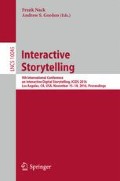Abstract
The presence of interesting and compelling characters is an essential component of effective narrative. Well-developed characters have features that enable them to significantly enhance the believability and quality of a story. We present an experiment designed to gauge an audience’s perception of specific aspects of character personality traits expressed through the characters’ choices for action. The experiment served as a formative evaluation for work on the development of the Mask system for the automatic generation of narratives that express character traits through choice. Results from our study evaluate the hypothesis that the relationship between choices and the actions they lead to can be used in narrative to produce the perception of specific personality traits in an audience.
Access this chapter
Tax calculation will be finalised at checkout
Purchases are for personal use only
References
André, E., Klesen, M., Gebhard, P., Allen, S., Rist, T.: Integrating models of personality and emotions into lifelike characters. In: Paiva, A. (ed.) IWAI 1999. LNCS (LNAI), vol. 1814, pp. 150–165. Springer, Heidelberg (2000). doi:10.1007/10720296_11
Anonymous: In: Rudder, R.S., Puertolas, C., de Rodriguez, C.: The Life of Lazarillo of Tormes: His Fortunes and Misfortunes As Told by Himself, p. 245. Ungar, New York (1973)
Assanie, M.: Directable synthetic characters. In: Proceedings of the AAAI Spring Symposium on Artificial Intelligence and Interactive Entertainment, pp. 1–7 (2002)
Bahamón, J.C., Young, R.M.: CB-POCL: a choice-based algorithm for character personality in planning-based narrative generation. CMN 2013, 4–23 (2013)
Barthes, R., Duisit, L.: An introduction to the structural analysis of narrative. New Literary Hist. 6(2), 237–272 (1975)
Bouchet, F., Sansonnet, J.P.: Influence of personality traits on the rational process of cognitive agents. In: Proceedings of WI - IAT, pp. 81–88. IEEE CS (2011)
Bulman, C.: Creative Writing: a Guide and Glossary to Fiction Writing. Polity, Cambridge (2007)
Chatman, S.B.: Story and Discourse: Narrative Structure in Fiction and Film. Cornell University Press, Ithaca (1978)
Doce, T., Dias, J., Prada, R., Paiva, A.: Creating individual agents through personality traits. In: Allbeck, J., Badler, N., Bickmore, T., Pelachaud, C., Safonova, A. (eds.) IVA 2010. LNCS (LNAI), vol. 6356, pp. 257–264. Springer, Heidelberg (2010). doi:10.1007/978-3-642-15892-6_27
Funder, D.C., Sneed, C.D.: Behavioral manifestations of personality: an ecologicalapproach to judgmental accuracy. J. Pers. Soc. Psychol. 64(3), 479–490 (1993)
Goldberg, L.R.: An alternative “description of personality”: the big-five factor structure. J. Pers. Soc. Psychol. 59(6), 1216 (1990)
Gonzalez-Abril, L., Cuberos, F.J., Velasco, F., Ortega, J.A.: Ameva: an autonomous discretization algorithm. Expert Sys. Appl. 36(3), 5327–5332 (2009)
Harris, J., Young, R.M.: Proactive mediation in plan-based narrative environments. IEEE TCIAIG 1(3), 233–244 (2009)
John, O.P., Donahue, E.M., Kentle, R.L.: The big five inventory - versions 4a and 54. UC Berkeley Institute of Personality and Social Research (1991)
John, O.P., Naumann, L.P., Soto, C.J.: Paradigm shift to the integrative big five trait taxonomy. Handb. Pers. Theory Res. 3, 114–158 (2008)
Laird, J.E., Jones, R.M.: Building advanced autonomous AI systems for large scale real time simulations. In: Computer Games Development Conference (1998)
LaPlante, A.: The Making of Story: a Norton Guide to Creative Writing. W.W. Norton, New York (2007)
Lazarus, R.S.: Progress on a cognitive-motivational-relational theory of emotion. Am. Psychol. 46(8), 819–834 (1991)
Lebowitz, M.: Creating characters in a story-telling universe. Poetics 13(3), 171–194 (1984)
Mairesse, F., Walker, M.: PERSONAGE: personality generation for dialogue. In: Annual Meeting-Association for Computational Linguistics, pp. 496–503 (2007)
McCrae, R.R., John, O.P.: An introduction to the five-factor model and its applications. J. Pers. 60(2), 175–215 (1992)
Meehan, J.R.: Tale-spin, an interactive program that writes stories. In: Fifth International Joint Conference on Artificial Intelligence, pp. 91–98 (1977)
Mehl, M.R., Gosling, S.D., Pennebaker, J.W.: Personality in its natural habitat: manifestations and implicit folk theories of personality in daily life. J. Pers. Soc. Psychol. 90(5), 862–877 (2006)
Riedl, M.O., Stern, A.: Failing believably: toward drama management with autonomous actors in interactive narratives. In: Göbel, S., Malkewitz, R., Iurgel, I. (eds.) TIDSE 2006. LNCS, vol. 4326, pp. 195–206. Springer, Heidelberg (2006). doi:10.1007/11944577_21
Riedl, M.O., Young, R.M.: Character-focused narrative generation for execution in virtual worlds. In: Balet, O., Subsol, G., Torguet, P. (eds.) ICVS 2003. LNCS, vol. 2897, pp. 47–56. Springer, Heidelberg (2003). doi:10.1007/978-3-540-40014-1_6
Riedl, M.O., Young, R.M.: Narrative planning: balancing plot and character. J. Artif. Intell. Res. 39(1), 217–268 (2010)
Tolkien, J.R.R.: The Hobbit. Houghton Mifflin, Boston (2001)
Twain, M.: The Adventures of Tom Sawyer (Tom Sawyer & Huckleberry Finn Series Book 1). kindle edn. Amazon Digital Services Inc. (2011)
Ware, S., Young, R., Harrison, B., Roberts, D.: A computational model of plan-based narrative conflict at the fabula level. IEEE TCIAIG 6(3), 271–288 (2014)
Ware, S.G., Young, R.M.: Glaive: a state-space narrative planner supporting intentionality and conflict. In: AIIDE, pp. 80–86 (2014)
Author information
Authors and Affiliations
Corresponding author
Editor information
Editors and Affiliations
Rights and permissions
Copyright information
© 2016 Springer International Publishing AG
About this paper
Cite this paper
Bahamón, J.C., Young, R.M. (2016). A Formative Study Evaluating the Perception of Personality Traits for Planning-Based Narrative Generation. In: Nack, F., Gordon, A. (eds) Interactive Storytelling. ICIDS 2016. Lecture Notes in Computer Science(), vol 10045. Springer, Cham. https://doi.org/10.1007/978-3-319-48279-8_11
Download citation
DOI: https://doi.org/10.1007/978-3-319-48279-8_11
Published:
Publisher Name: Springer, Cham
Print ISBN: 978-3-319-48278-1
Online ISBN: 978-3-319-48279-8
eBook Packages: Computer ScienceComputer Science (R0)

